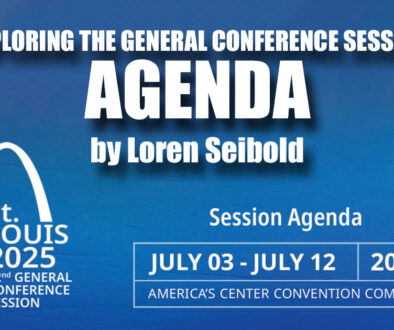Africa’s Romanticization of Conservative Adventism
by Admiral Ncube | 27 August 2020 |
Here in Africa, the reports of the growth of Christianity on our continent have filled us with pride. That Adventism in Africa has continued to be conservative and faithful compared to other parts of the world has been a reason for celebration. Some claim that the Adventism practiced in Africa is the genuine thing—a legacy from the work of early Christian missionaries—despite being eurocentric in liturgy and polity. To admit that Adventism in Africa may have toxic elements would earn the sanctified wrath of the saints.
Yet these assumptions show little understanding of how Adventism’s relationship with fundamentalism in the 1900s, during the same time when missionaries set foot on our continent, shaped our expression of this faith. We have regarded liberalism as our greatest enemy, but unknowingly glorify fundamentalism under the guise of conservatism and faithfulness. This itself is toxic, and robs us of a genuine experience with Jesus.
It is the romanticization of conservative Adventism that this article seeks to explore.
Adventism and Fundamentalism
Though the term “fundamentalist” in popular use refers to militant conservative religionists, or in a doctrinal sense to those who insist on certain traditional doctrines, Fundamentalism (capitalized) was a historical movement within American Protestant Christianity. It dates to the early 1900s and describes a loose coalition of conservative Christians who constructed their identity around the Bible, which they regarded as being beyond the reach of human criticism. Fundamentalists had a “conspicuous militancy in defending what is regarded as the traditional Protestant Gospel against its major twentieth-century competitors.”[1] Their main points of concern were modernism or liberalism in theology, and secularism in cultural values, with specific opposition to evolution, Marxism and Roman Catholicism.
Adventist historian Michael Campbell describes how Adventists “flirted” with fundamentalism, briefly embraced it and later “dumped and denied the existence of any relationship with it.”[2] Adventists were attracted to fundamentalism’s commitment to core evangelical beliefs against modernism, together with the lack of any centralized leadership. At one time Adventists publicly declared themselves “the only true fundamentalists,” “fundamentalists of the fundamentalists,” and “chief of fundamentalists.”[3] General Conference President William A. Spicer said, “All through the years, from 1844 on down, the whole teaching of the advent message has been fundamentalism itself.”[4]
With the passage of time, fundamentalism became associated with images of religious terrorism, aggressive conservatism, excessive seriousness, intellectual mistrust, sectarianism, scepticism of science, and patriarchal preferences, all which seemed “unmodern.”[5] This prompted an aggressive rejection of the word “fundamentalist” by Adventist leaders. Adventist administrator Wilbur K. Nelson was among those who rejected the term “fundamentalist,” arguing that the fundamentalists of his day had departed from their former faithfulness, and had become dispensationalists and professors of a pious peevishness. General Conference president Neal C. Wilson agreed in 1980 that, theologically, Adventists do not qualify as fundamentalists: “The word fundamentalist in itself is not a good description of Seventh-day Adventists today, because theologically it has implications that really do not harmonize with our position.”[6]
Yet Adventism’s flirtation with fundamentalism in the 1900s shows how much of what we celebrate as conservative Adventism has its roots not in historic Adventism, but in the Fundamentalist movement. The early Adventist missionaries were influenced by prevailing Fundamentalist ideas of the day, which they passed on to their converts, and this version of Adventism has been dominant in Adventist culture in Africa where it is often mistaken for faithfulness to “the old-time religion.” Our sensitivity to issues such as the role of women in church, Bible versions, Christian dress, recreation and lifestyle betrays fundamentalist undertones.
An Obsession with the Book
At the core of historic Fundamentalism is the verbal inerrancy of Scripture—i.e. that the Bible lacks error in every way in all matters. Fundamentalists’ view of inspiration is that the Bible contains the very words of God, verbally dictated to the various writers. You may even have heard in the Adventist church such statements as, “Every word in the Bible is there for a purpose”, or “The devil is cunning—he can change one little word in the Bible without us knowing” or “The King James Version is the only authentic version close to the original languages—all other versions are corrupt”.
Fundamentalists read the Bible literally, often ignoring that there is metaphor and poetry there which cannot be read literally, seemingly ignoring the context and logic of it.
This is not what Ellen White taught. She wrote,
The Bible is written by inspired men, but it is not God’s mode of thought and expression. It is that of humanity. God, as a writer, is not represented.… It is not the words of the Bible that are inspired, but the men that were inspired. Inspiration acts not on the man’s words or his expressions but on the man himself, who, under the influence of the Holy Ghost, is imbued with thoughts. But the words and thoughts receive the impress of the individual mind. 1 Selected Messages, 21
We cannot deny that there are minor errors and conflicting accounts in the Bible. But that does not make its origin less divine. It rather reveals the social and cultural context of the authors. What concerns us is the overall message, and its alignment to the great theme of salvation.
The rigidity of fundamentalism is also seen in its obsession over the King James Version, written in a language that no one uses today. But the focus on the message means no one Bible version is holier than the other, because our quest is the message, not the grammatical expression of it.
An Obsession with Truth
Adventist fundamentalism has had an unhealthy preoccupation with “the truth.” It regards the truth as a list of abstract ideas, doctrinal beliefs or facts. These become an end in themselves, and defending them our core business. Anything that seems to be different from “the truth” is rejected, and those behind it maligned. In the name of faithfulness, fundamentalists can be rude, defensive, and intolerant. “Fire and brimstone” sermons portray God as vindictive, and only speakers who exhibit the same zeal are welcome, while others are accused of cheapening grace.
This thinking ignores that Jesus himself is the truth (John 14:6), for the truth is a relationship with a person. Fundamentalists seem to forget that we don’t have a relationship with a book. The Bible is a tool for our relationship with God. In describing the diverse relationships former generations had with Him, it points beyond itself to God.
An Obsession with Perfectionism
This truth-focused fundamentalism leads naturally to perfectionism. In Adventism, this is often expressed in terms of Last Generation Theology as voiced by M.L. Andreasen in the late 1930s.[7] Last Generation Theology said that the character of God, maligned by Satan in the great controversy, can be vindicated only through the holy and perfect life of obedience of a last generation of believers. Once they reach a level of character development unequaled in Christian history, the Lord will return. This is given voice in a quote from Ellen G. White:
Christ is waiting with longing desire for the manifestation of Himself in His church. When the character of Christ shall be perfectly reproduced in His people, then He will come to claim them as His own.” Christ’s Object Lessons, p. 69
The “character of Christ” is understood by Adventist fundamentalists to be flawless law keeping resulting in a sinless state, the achievement of which will bring Jesus back again.
The New Testament is clear that Jesus Christ was given as an expression of God’s love, as shown by His death on the cross. It is this character of love (to God and to humanity) which is to be reproduced in us, not some pharisaic attempts to keep the law. In Matthew 5:48 Christ’s call for us to be perfect as our Father is perfect is given in the context of how we treat our enemies and do good to those who treat us unfairly. In Luke 6:36, perfection is replaced with mercy—again, not perfection in law keeping but perfection in love. We grow in loving God supremely and our neighbours as ourselves (Luke 10:27).
Last Generation Theology perfectionists focus on law keeping as an act of compliance, in order to earn a place among the 144,000. They forget that it is the matchless merits of Jesus that qualify them, not perfect behaviour.
An Obsession with Separatism
Separatism is the natural outgrowth of perfectionism. The fear of being contaminated may lead some Adventists to live away from urban areas, or isolate from those who are not of their brand of Adventism. The less they participate in public events or know of popular trends, the more virtuous they feel.
These fundamentalists find virtue not only in doing right, but by not doing wrong. So instead of seeing good in others, they identify those things that others need to change. Evangelism focuses not on Christ, but on proving our doctrines and correcting others’ problems.
By trying to keep worldliness out of the church, fundamentalism has also kept the church out of the world. We forget that much of what we regard as Adventist is not Adventist in origin. This includes most of our doctrines, the camp meeting model, the Sabbath school format, most of our hymns, Pathfinder clubs, and many other things. Even Ellen White drew on secular sources when writing The Great Controversy. That shutting ourselves off from the world is God’s will is a deception of fundamentalist thinking.
Fundamentalism makes us view everything with suspicion—always hunting for heresies, and making celebrities of those who expose said heresies. By viewing everything in terms of liberalism or apostasy, fundamentalists ignore toxic elements in the conservative extremism we espouse, such as its thirst for control. They must be strict, intolerant and judgmental. Non-essential issues such as dress, watching movies, or participating in sports are turned into essentials. Scripture is manipulated to entrench patriarchy and sanctify misogyny.
Every little thing is exaggerated into a matter of salvation. That theirs is the only interpretation of the Bible and Ellen White means that Adventist fundamentalists cannot tolerate freedom of conscience, or free discussion and expression.
Fundamentalists require too much from those within the community, even while consumed with criticism of those who don’t share their views.
The Spiritual Poverty of Fundamentalism
Many of us who embraced fundamentalist thinking were motivated by a deep love for the church. In trying to live in a dynamic culture, as here on the African continent, the natural impulse is to push back against change with hostility. I was among those sincere African Adventists who was so fearful of contamination that I would read only Adventist books, listen only to Adventist speakers, sing what I viewed as acceptable Adventist songs, have no other friends except Adventists, and avoid keeping company with anyone else unless I was evangelising them. In practicing “righteousness by separation” I forgot that salt can only be salty if it mingles with the food it seeks to season.
The time has come for us to calm down and engage culture. The days of pulling people in through our tent meetings are over. Old strategies of mission aren’t working any longer. People are looking for relationships instead of expectations, a place where they are loved, not instructed in the right doctrines.
Fundamentalism limits our ability to be relational. It places us on guard about “getting it right.” In putting the emphasis on externals, compliance, and regulating behaviour instead of interpersonal connections, Adventist fundamentalism is toxic. It consumes time and energy. It drains away any assurance of salvation. Behind the quotes and verses, fundamentalism breeds SADventists—a grumpy people devoid of love, joy, peace, and gentleness.
More importantly, fundamentalism misrepresents the character of God and robs us of the opportunity to experience Him.
It is my wish that as Africans we see how much of what we do and uphold bears the marks of fundamentalist thinking. We need to be wary of sermons that place emphasis on regulating behaviour, stewardship lessons that portray a vindictive God, altar calls that terrorize rather than attract, a manipulation of scripture and Ellen White writings by taking them out of context, and romanticization of fundamentalism under the guise of conservative tradition.
Let’s not require what God has not required; rather, let’s allow God to show us how to love the world around us.
- Encyclopedia of the American Religious Experience, s.v. “Fundamentalism. ↑
- Michael Campbell; 1919: The Untold Story of Adventism’s Struggle with Fundamentalism (Pacific Press), 2019. ↑
- General Conference Bulletin, May 30, 1930 (Vol. 107, No. 23), 5. Cf. I. A. Crane, “Are You Really a Fundamentalist?,” Southwestern Union Record (March 23, 1926): 2. I. A. Crane, “Are You Really a Fundamentalist?,” Columbia Union Visitor (April 22, 1926): 8. W. W. Prescott also declared himself a fundamentalist. W. W. Prescott, “The Gospel of a Fundamentalist,” Signs of the Times, (April 29, 1924) ↑
- W.A. Spicer, “The Message That Answers the Need,” The Advent Review and Sabbath Herald (July 4, 1929) ↑
- Matthew J. Lucio, November 11, 2019, Shall Adventist Fundamentalists Win?, Spectrum Magazine. https://spectrummagazine.org/news/2019/shall-adventist-fundamentalists-win ↑
- “53rd General Conference Session,” Adventist Review, April 24, 1980; 18 (546). ↑
- The Sanctuary Service [Washington, D.C.: Review and Herald Pub. Assn., 1937; revised 1947]). ↑
 Admiral Ncube (PhD) is from Zimbabwe. He is a development analyst based in Botswana. He is a father of three and husband to Margret.
Admiral Ncube (PhD) is from Zimbabwe. He is a development analyst based in Botswana. He is a father of three and husband to Margret.




